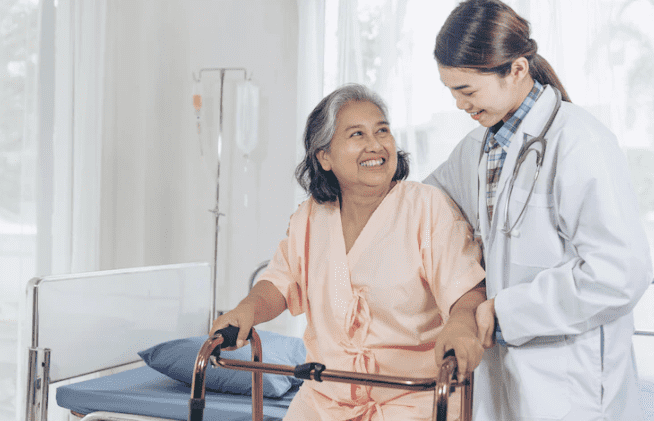Understanding Senior Women’s Top Health Threats for Care Professionals

Though many health issues are consistent amongst genders, there are certain conditions that are more likely to affect senior women than senior men. Understanding the main issues for senior women can facilitate a greater ability to combat them. This post focuses on some common problems to recognize in senior women’s for care professionals and how to notice the red flag signs.
Allergies
Even if allergies have never been an issue previously, they can still develop in later years. Senior women are a high-risk category for new allergies taking hold. This can be anything from shellfish to nuts to animals. Though it is more common for allergies to be present consistently throughout life from an early age, they can appear seemingly out of the blue as life progresses, especially in the age bracket of the over 65s. Allergic reactions can cause death, and any care professional should be mindful of the potential risks.
Asthma
Asthma is a fairly common occurrence in women over the age of 65. It can be recognized by shortness of breath brought on by movement, gentle or otherwise, a cough, tightness in the chest, and even sickness. It can also be triggered by respiratory infections such as viruses.
If untreated, asthma can lead to respiratory complications such as bronchitis, pneumonia, and general trouble breathing. These are all potentially fatal ailments in the over 65’s and should be taken seriously. Senior women are at risk because the body’s defenses tend to weaken at a certain point and asthma can take hold as it pleases.
Heart Disease
Heart disease is also relatively concurrent amongst senior women, but there are a few risk factors that put a person at a greater potential for exposure. Heart disease is the deterioration of heart health and function and can lead to heart attack and other cardiac complications.
In fact, heart disease is cited as the biggest cause of death amongst senior women. There are many risk factors to consider including familial history; daily habits and vice activity, like smoking or alcohol intake; weight and diet components, and exercise engagement. Menopause can also be a causal influence on heart disease progression.
The more traditional symptoms of a heart attack for men are different from those for women, particularly senior women who are more at risk. Moving away from the shooting pain in the left arm, women tend to get pain in the upper jaw, neck, and head areas first. This can be followed by sweating, dizziness, pain in either or both arms, and extreme heartburn symptoms. If any of these symptoms occur, a cardiac arrest is a likely cause and emergency immediate care should be sought out.
Obesity and Dietary Issues
Obesity can lead to many complications in later life. High blood pressure, cholesterol problems, mobility struggles, muscle and joint pain, heart disease, and even Alzheimer’s – are all things that can be a direct result of excessive weight gain and poor diet management.
There is high value in implementing a proper food system that is heavily regulated towards promoting good health and focusing on a positive balance. There is little chance of dramatic weight loss the older a person gets, unfortunately, so if the problem is already established it becomes more of a matter of management, small changes, and delay tactics, as opposed to a complete combatting strategy approach.
Mental Health
Mental health in senior women is often overlooked; however, it is a leading factor in general deterioration. Depression and anxiety are two of the most common issues faced by females over the age of 65 – but they are often dismissed or go unnoticed owing to other environmental factors. Combat mental health through external stimulation such as ensuring loneliness isn’t an issue, providing engaging activities, and facilitating social ventures where possible. If necessary, introduce medication into the mix after an assessment from a clinician.
Cancers
Breast, ovarian and cervical cancer are all women-specific cancers that are more prevalent in the senior population. Ensure proper checks are in place and symptoms are monitored to catch any potential cancers early and ensure the right treatment can take place. Though the outlook is often not great for seniors diagnosed with this branch of disease, there are ways to ease the burden and combat the symptoms.
Check for breast lumps, any abdominal pain, and cervical changes on a regular basis to ensure that nothing is missed. Breast cancer is one of the most common types to affect women over the age of 60, therefore it should be on the radar of every caring professional in charge of these needs.
Alzheimer’s
Alzheimer’s disease is usually an exclusive occurrence in senior people, though rare instances have seen it appear at younger ages too. It is a primarily degenerative disease that causes a decrease in memory and general cognitive function. Warning signs to look out for include:
- A change in mobility ability such as stooped posture or struggling to move about as normal.
- A sudden decline in the ability to perform usual daily tasks such as cooking, self-care, and general activity.
- A decline in conversational skills – a general sense of forgetfulness or disorientation.
How to Gain Further Insight
As a care professional in charge of the needs of the elderly generation, there is always knowledge to be gained. One way to do this is through furthering and broadening your education. Studies and schemes are constantly updating in line with new research, and to be the best you can be in your role, it is essential to keep up with training and developments. Courses like this one from Wilkes AGNP, focus on relevant content, and you can keep going with the practical side of nursing while undertaking studies as well.
There is always something to learn when it comes to looking after senior women and recognizing their health needs. There are some things that only pertain to women specifically, and these tend to be the biggest cause of death in the over 65s. Therefore, getting the right knowledge and understanding of how to look after these care needs is imperative.
Read More: Essential Hair Oil





